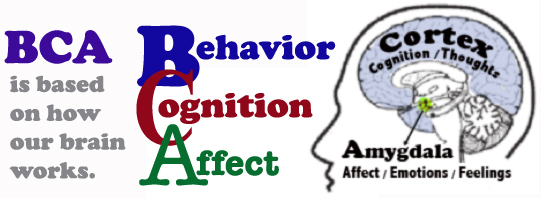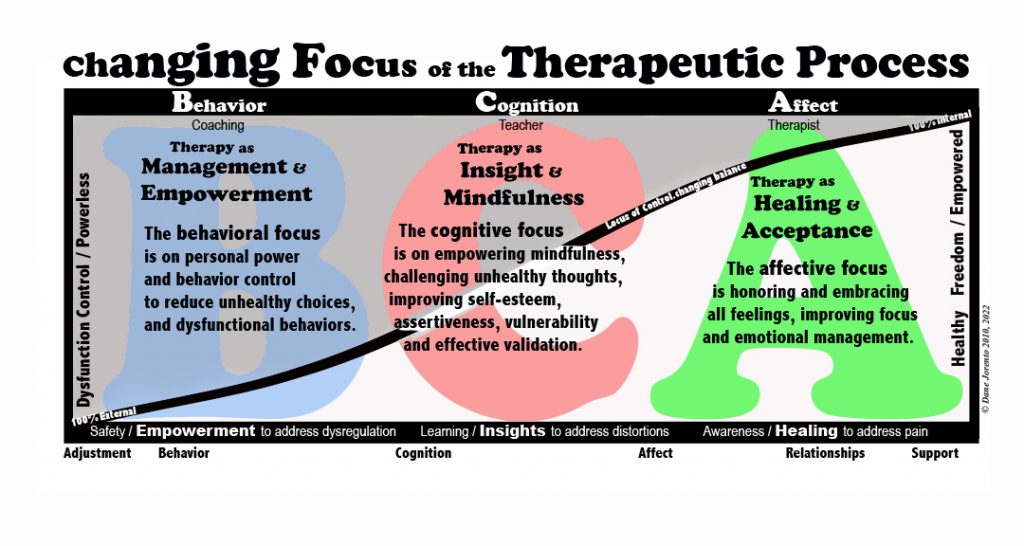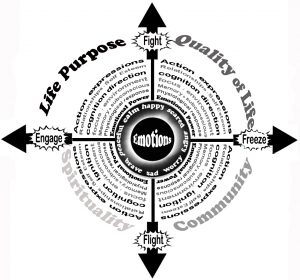Part 1:
Overview

The BCA Holistic approach to mental health is first and foremost grounded in client empowerment and therapeutic transparency. It is designed to be interactive, validating and treat the whole person – actions, thoughts and feelings – with a shifting therapeutic role and intervention focus based on a client’s comprehensive and ever-changing mental health needs and relationships.
The BCA Holistic approach is based on the latest information on brain development, functioning and neurology. BCA recognizes the distinct process and impact of thoughts, feelings and actions on personal development. It assesses a client’s Behaviors, Cognitions and Affect (BCA) to understand the 1) current dysfunction, 2) level of discomfort, and 3) effective skills to effectively manage their emotional power, relationship and unique change process and path. It incorporates specific interventions to manage emotional power, behavioral choices and cognitive habits, processes and distortions. It openly evaluates changes that are interpersonally integrated and generalized, as well as, stable and durable across time and environments.
BCA Holistic incorporates Edward Deming’s concepts of quality service delivery to 1) provide a consistent therapeutic approach; 2) evaluate BCA specific service needs; 3) implement interventions based on identified needs; and 4) obtain and incorporate an ongoing whole process feedback. The goal is a complete holistic intentional and mindful approach to mental health. Edward Deming wasn’t a mental health therapist; he was a New York University statistics professor who looked at the whole system processes of how manufacturing worked to provide the highest quality products and services.
The BCA Holistic Mental Health Therapy (often called BCA Holistic, or just BCA) is unlike other mental health approaches because it was inspired by directly working with clients seeking to improve their mental health. BCA did not start at a University setting or by a Psychiatrist or Professor’s research of a therapeutic model, but evolved directly from dealing with a client’s painful experiences by a compassionate, creative and energetic therapist willing and committed to finding and creating the highest quality, most effective therapeutic interventions based on the client’s needs and current accurate science. The focus wasn’t on creating a new therapy model but on improving mental health. And, in trying to improve our quality of life with better mental health, a new approach was created that expanded on the traditional approaches to mental health. BCA is an outside the box, highly effective approach to help real people with their struggles living outside the box.
Finally, the BCA Holistic approach would not be possible without the many influential clients, therapist, researchers, neurologists, providers, peers, friends and family from which BCA evolved. There are too many contributors to name, but their perspectives and challenges over the years are very much appreciated. Thank you. I would specifically like to thank Marcia Linehan for the creation of DBT; Francine Shapiro for EMDR; Milton Erickson’s narrative approach, Eric Erickson’s model of personal development; Edward Deming’s Quality Service Delivery Concepts, and of course, Daniel Goleman who wrote Emotional Intelligence, a book that went from being an inspiration to my nemesis when I discovered that there is no such thing as emotional intelligence.






Pingback: BCA Holistic Mental Health Therapy: Assessment - Emotional Powers